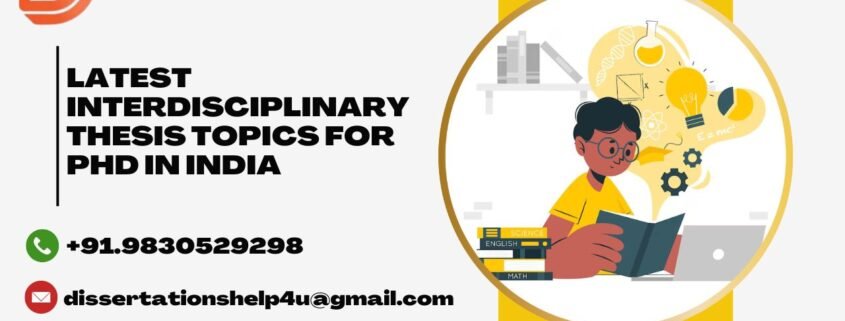Latest Interdisciplinary Thesis Topics for PhD in India
Latest Interdisciplinary Thesis Topics for PhD in India
Latest Interdisciplinary Thesis Topics for PhD in India. India’s academic and research landscape is undergoing a transformative shift, where interdisciplinary research is no longer a choice but a necessity. With the implementation of the National Education Policy (NEP) 2020, greater emphasis has been placed on breaking down silos between academic disciplines. The rise of real-world problems—climate change, digital governance, smart infrastructure, public health crises, and sustainable development—demands that PhD scholars work at the intersection of multiple disciplines.
In this article, we provide a comprehensive list of the latest interdisciplinary thesis topics for PhD in India, which combine insights and methodologies from fields such as technology, social sciences, environmental science, management, law, policy, health, and humanities.
Interdisciplinary Research in Health, Technology, and Policy
1. AI-Powered Public Health Systems: A Policy and Technology Integration
Explore how artificial intelligence can be integrated with public health policy frameworks to improve disease surveillance, health planning, and pandemic response in India.
2. Mental Health and Digital Interventions: A Psychological and Technological Approach
Study the effectiveness of mobile mental health apps using psychological theories, data analytics, and user interface design tailored for India’s diverse population.
3. Telemedicine in Rural India: Integration of Medical Sciences, IT, and Public Administration
Assess the feasibility and impact of telehealth ecosystems in underserved areas by combining healthcare, ICT, and governance frameworks.
Interdisciplinary Environmental and Technological Research
4. Smart Cities and Climate Resilience: Integrating Urban Planning, IoT, and Environmental Science
Investigate how Internet of Things (IoT) technologies can aid in urban sustainability and climate resilience, focusing on smart city initiatives in India.
5. Water Conservation Technologies and Community Behavior: A Fusion of Environmental Engineering and Behavioral Economics
Examine how engineering innovations and community behavioral models can jointly enhance water conservation practices in drought-prone areas of India.
6. Blockchain for Sustainable Supply Chains: Technology Meets Environmental Management
Explore the use of blockchain technology to ensure transparency and sustainability in agriculture and textile supply chains, involving tech, law, and environmental policy.
Interdisciplinary Topics in Education, Psychology, and Technology
7. Personalized Learning Using AI: Bridging Education, Data Science, and Psychology
Develop adaptive learning platforms based on machine learning, rooted in educational psychology and Indian school pedagogy models.
8. Inclusive Education for Disabled Learners: A Convergence of Special Education, AI, and Policy
Design tech-enabled learning solutions for children with disabilities by combining assistive technology, special education theory, and government policy.
9. Bilingual Learning Models: Integrating Linguistics, Pedagogy, and NLP
Create Natural Language Processing (NLP) tools that facilitate bilingual education in regional languages and English, applying linguistics and AI.
Interdisciplinary Development Studies and Technology
10. Digital Financial Inclusion for Women in Rural India: A Fusion of Gender Studies, Fintech, and Development Policy
Study the impact of digital banking and UPI-based services on rural women’s financial empowerment, involving technology, gender equity, and economics.
11. Urban Migration and Technology-Driven Social Services: Linking Sociology, Urban Planning, and Digital Platforms
Design integrated systems for migrant workers using GIS, mobile platforms, and policy design to improve housing, healthcare, and education access.
12. Smart Governance and Civic Tech in India: Public Policy, Data Science, and Ethics
Build a framework for AI-enabled decision-making systems in local governments using policy studies, ethics, and data analytics.
Interdisciplinary Research in Law, Technology, and Ethics
13. AI and Privacy in India: A Legal and Technological Analysis
Examine India’s evolving data privacy landscape, juxtaposing legal frameworks (like the Digital Personal Data Protection Act) with AI technologies that process sensitive information.
14. Cybersecurity Policy in Indian Enterprises: A Cross-Disciplinary Study of Law, IT, and Risk Management
Assess how Indian businesses are implementing cybersecurity strategies, integrating IT protocols, legal compliance, and organizational behavior.
15. Regulating Fintech in India: Balancing Innovation and Consumer Protection
Explore the intersection of financial regulation, law, and emerging technologies like blockchain, digital lending, and AI in credit scoring.
Interdisciplinary Research in Arts, Culture, and Digital Innovation
16. Preserving Indian Heritage through Virtual Reality: A Mix of Culture, Tech, and Education
Use VR and AR technologies to preserve and teach Indian art, architecture, and folklore, combining digital tools with heritage studies.
17. AI and Ethics in Indian Literature: Philosophical, Technological, and Literary Intersections
Analyze AI’s portrayal and ethical concerns using Indian philosophical texts, postcolonial literature, and emerging technologies.
18. Indigenous Knowledge Systems and Climate Change Adaptation: Anthropology Meets Environmental Science
Document and evaluate tribal and rural communities’ knowledge for climate resilience, combining anthropology, climate science, and policy.
Interdisciplinary Research in Economics, Business, and Sustainability
19. Circular Economy in Indian Manufacturing: A Fusion of Economics, Engineering, and Policy
Study how circular economy models can reduce waste and increase profitability in sectors like automotive, textile, and electronics.
20. Green Finance in India: Sustainability, Economics, and Policy Synergy
Explore the development of green bonds, ESG investing, and sustainable financial instruments within Indian regulatory and environmental frameworks.
21. AI in Business Ethics: Redefining Corporate Responsibility in Indian Startups
Evaluate how ethical AI adoption is impacting decision-making, compliance, and trust in emerging Indian startups.
Interdisciplinary Governance and Disaster Management
22. Disaster Risk Reduction through AI and Social Science Integration in India
Design early-warning systems for floods, earthquakes, and cyclones, merging AI modeling, community behavior, and policy planning.
23. Resilient Infrastructure Planning: Engineering, Economics, and Climate Science
Create cost-effective and climate-resilient infrastructure models using structural engineering, cost-benefit analysis, and climate projections.
Interdisciplinary Research in Energy and Smart Technology
24. Smart Grid Implementation in India: Power Systems, Data Analytics, and Policy
Analyze challenges and opportunities in smart grid deployment using a blend of electrical engineering, data science, and regulatory studies.
25. Renewable Energy Adoption in Indian Households: An Interdisciplinary Model
Combine consumer behavior, solar technology, and government incentives to increase renewable energy adoption at the grassroots level.
Conclusion
Interdisciplinary research is the future of doctoral studies in India. As problems become more complex, combining insights from various disciplines allows researchers to produce holistic, practical, and high-impact solutions. Whether in technology, governance, healthcare, environment, or education, these thesis topics reflect the changing dynamics and urgent needs of Indian society. Aspiring PhD scholars should seize the opportunity to explore these intersections to lead transformative research.
Thank you for read our blog “Latest Interdisciplinary Thesis Topics for PhD in India”.
I hope this blog is helpful to you, if you have any question feel free Call / WhatsApp: +91.9830529298 || Email: dissertationshelp4u@gmail.com
Also read our more BLOG here.















Leave a Reply
Want to join the discussion?Feel free to contribute!